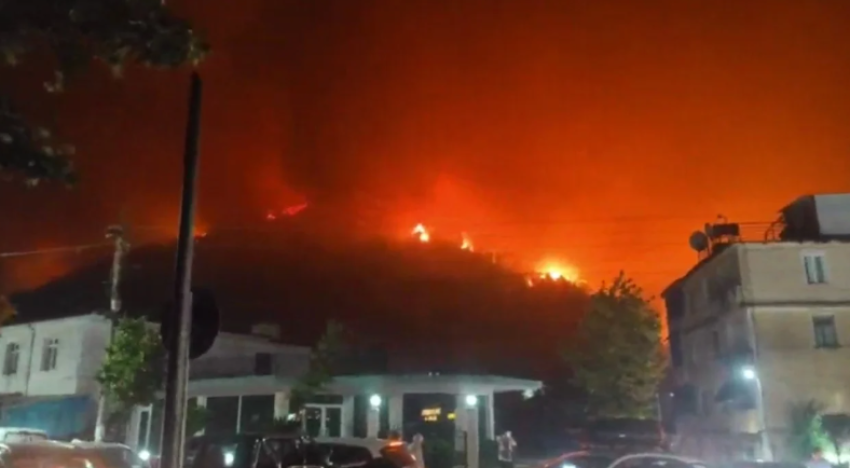Albania is facing one of its most challenging wildfire seasons in recent years, with multiple regions engulfed in flames and emergency services stretched to their limits. The most alarming situations are reported in the southern town of Delvinë and the central municipality of Gramsh, where fires have destroyed dozens of homes, forced evacuations, and caused widespread environmental damage.
Delvinë Surrounded by Flames
In Delvinë, residents woke up once again to the terrifying sight of flames encircling the city’s surrounding hills. The fires, driven by strong winds, have spread rapidly to the outskirts of the town, prompting an urgent aerial intervention. Two firefighting helicopters have been deployed to drop water on the worst-hit areas, while ground crews battle to keep the blaze away from populated zones. Power supply in parts of the city has been cut as a safety measure.
Plator Nesturi, the Prefect of Vlorë, reported that four homes have been burned in Delvinë, only one of which was inhabited at the time. Fortunately, no injuries have been reported. While the flames have moved closer to residential neighborhoods, Nesturi assured that there is no current risk to critical infrastructure such as the city hospital and the nearby oil wells. However, fires have reactivated in surrounding rural areas, and firefighting teams remain on high alert to prevent further spread.
Gramsh in a State of Emergency
The situation in Gramsh is even more critical, particularly in the administrative unit of Skënderbegas. Here, several villages have been heavily affected, with local authorities confirming that 39 homes were destroyed in the fires that swept through the area yesterday. The damage is spread across multiple villages:
Bletëz: 5 houses burned
Zenelaj: 3 houses burned
Skënder: 8 houses burned
Shimer: 3 houses burned
Harunas: 5 houses burned
Kullollas: 15 houses burned
The most dangerous fire front is currently in the village of Menkollar, where flames threaten to reach Nartë, Gramsh’s largest village. On the ground, three firefighting trucks, dozens of soldiers, professional firefighters, and many local volunteers are working relentlessly to create firebreaks. Two helicopters are actively dropping water over the affected area, and a third helicopter has been dispatched to reinforce operations.
Authorities are also responding to renewed fires in the villages of Ermenj and Koshnicë. The flames here have moved dangerously close to the border with Korçë Prefecture, raising fears that the fires could spread into another administrative region. Additional fire activity is reported near the Dushku Tekke, where large areas of forest and pasture are burning. Meanwhile, in the village of Kodovjat near Posnovisht, the situation has calmed somewhat, but emergency crews remain on standby due to changing wind conditions.
Prefect of Elbasan, Ilir Bejtja, stated that “the situation remains severe, with multiple active hotspots and unpredictable fire behavior. Our priority is to protect Nartë and prevent the fires from spreading into new territories. All available forces are engaged, and reinforcements are being deployed from neighboring municipalities.”
Elsewhere in the Country
In Memaliaj’s Koshtan village, a fire that destroyed three homes and caused extensive damage to olive groves and orchards has been extinguished thanks to joint efforts by firefighters, residents, police, and municipal workers. Another blaze in Hormovë has also been brought under control and is under constant surveillance to prevent reignition. Despite these successes, authorities warn that many rural areas remain highly vulnerable due to high temperatures, strong winds, and dry vegetation.
Nationwide Response
Across all affected regions, more than 55 army personnel, multiple firefighting units, and hundreds of volunteers are working side by side. The government has urged the public to remain vigilant and to report any signs of new fires immediately. Emergency services stress that shifting wind patterns and extreme heat could cause the situation to deteriorate further in the coming hours.
As Albania continues its battle against the flames, the resilience and cooperation between local communities, emergency crews, and the armed forces remain a crucial factor in preventing further loss of homes, farmland, and natural habitats.

